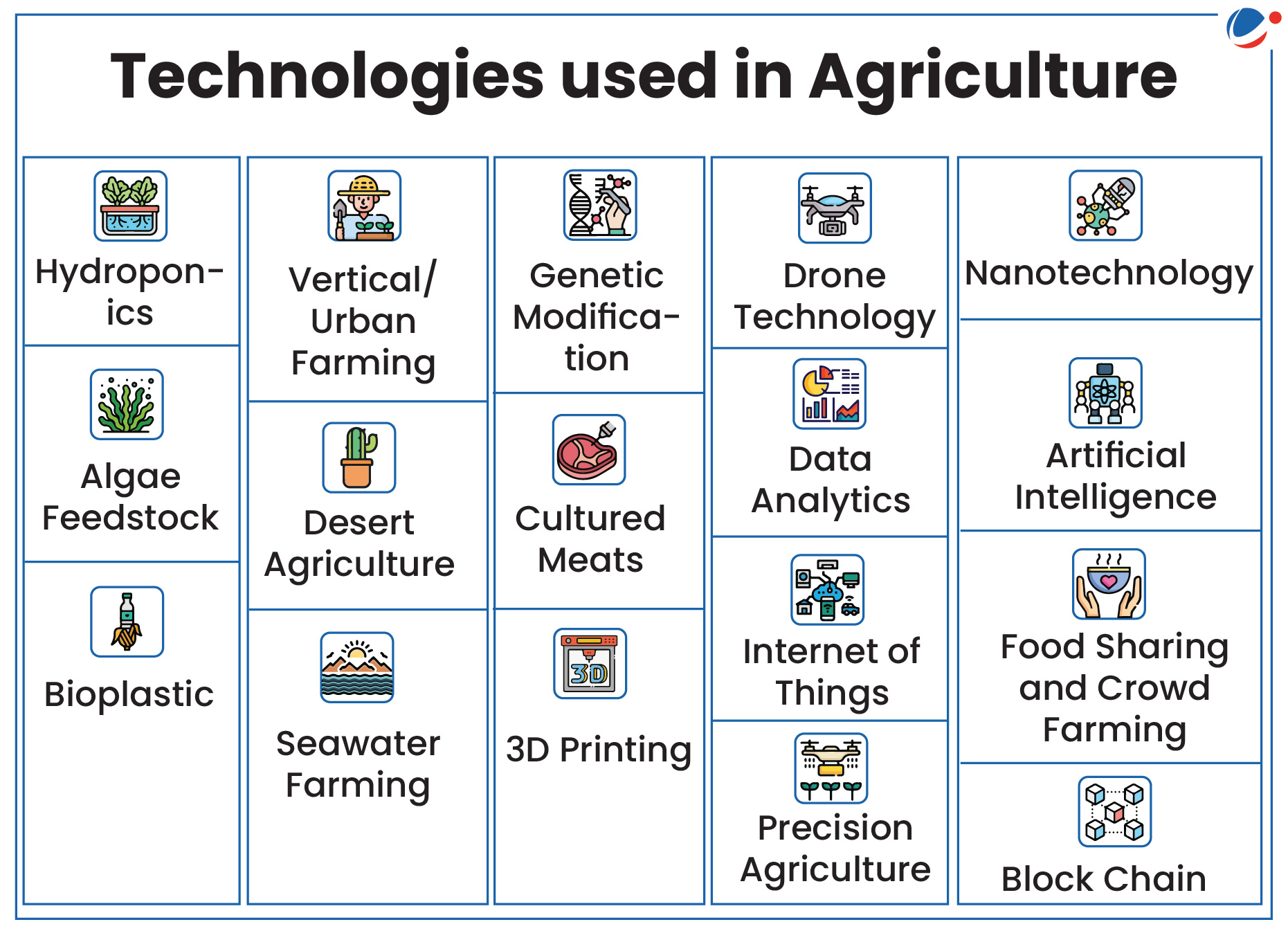Why in the News?
World Economic Forum (WEF) in partnership with PwC India released a report titled "Agritech: Shaping Agriculture in Emerging Economies, Today and Tomorrow"
What is Agri-Tech?
- Agritech or agriculture technology is the term referring to the use of technological innovations in agriculture to increase its yield, efficiency, and profitability.
- It employs advanced technologies, such as artificial intelligence (AI), IoT (Internet of Things), biotechnology etc.

Role of Agri-Tech in Agriculture Ecosystem
- Intelligent crop planning: It involves the use of emerging technologies such as Gene Editing, AI-based soil-testing solutions advice etc. to create a detailed, market-oriented and sustainable crop plan.
- Smart farming: Also known as precision farming, it is the use of technologies to improve efficiency in farm operations. E.g., AI and Augmented Reality (AR) for crop planning, hyperlocal weather predictions etc.
- Farmgate-to-fork: To address underlying issues such as a lack of quality standards, crop loss between farm and market, access to storage facilities etc. E.g., Traceability using blockchain, Internet of Things (IoT) enabled warehousing, smart logistics and more.
- Data governance: Ease of access to high-quality, usable data can generate social-economic value for both farmers and industry alike.
- For instance, Digital Public Infrastructure (DPI) in agriculture is a critical enabler of agritech services in emerging economies.
Potential impact of AgriTech impact on Environment | |
Positive
| Negative
|
Initiatives taken by India in AgriTech
- Promotion of Agri-Startups: They provide innovative solutions like farm management software, online marketplaces for agricultural produce, and farm advisory services etc.
- Around 2800 AgriTech startups (like BigHaat, Fasal, MeraKisan etc.) are recognised by Startup India.
- Innovation and Agri-Entrepreneurship Development programme: under Rashtriya Krishi Vikas Yojana (RKVY) from 2018-19 to provide financial and technical support for nurturing the startup ecosystem.
- 5 Knowledge Partners (KPs) and 24 RKVY Agribusiness Incubators (R-ABIs) have been appointed for training & incubation of agri-startups and implementation of this programme.
- Agriculture Accelerator Fund: Govt. has approved a fund of Rs. 500 crore for five years commencing from 2023-24 to encourage young entrepreneurs to set up agri-startups in rural areas.
- Agri Stack: Designed to facilitate the delivery of agritech and other digital services to farmers by the government, agritech start-ups, the private sector or other institutions.
- Agricultural Data Exchange (ADeX): It is an open-source, open-standard and inter-operable public good that allows data sharing between data providers and data consumers, mainly the private sector, including start-ups, to build customized services for farmers.
- Digital Agriculture Mission (DAM): This initiative was launched in 2021 to help agri-tech start-ups by leveraging advances in cloud computing, earth observation, remote sensing, data, and AI/ML models.
- Agricultural Technology Management Agency (ATMA) Scheme: It supports the State Government's efforts to make available the latest agricultural technologies through different extension activities like Farmer's Training, Demonstrations, Kisan Mela etc.
Challenges in Agritech adoption
- Limited Digital Literacy: India's farmers lack the technical expertise and hands-on experience required to effectively operate machinery and software, hindering their ability to utilize advanced agricultural technology.
- Infrastructural Barriers: Rural areas often face inadequate network coverage and slow internet speeds, hindering the adoption and effectiveness of agri-tech solutions.
- Resource Constraints: A substantial number of farmers in rural India operate on small landholdings and have limited financial resources. Adopting agritech solutions can be expensive, especially when it comes to buying software and equipment.
- Resistance to Change: Traditional farming methods have been ingrained in rural Indian communities for generations. Convincing farmers to embrace technological interventions can be challenging.
- Job loss: With farming being a major source of employment across the country, automation in the agriculture sector could have a significant impact on the local economy leading to large-scale job loss.
Way forward
- Linking digital and physical channels: for instance, using an existing channel of farmer collectives, cooperatives or organized channels, such as e-governance agents – will be crucial in driving the adoption and active use of agritech services.
- Diversification of Income Streams: Adoption of agritech makes it possible to diversify revenue sources outside of traditional farming. Agritech solutions can be developed and marketed by rural entrepreneurs, boosting local economies and generating job possibilities.
- Building awareness among farmers: The government and civil society must work together to educate Indian farmers in the use of cutting-edge digital and digital technology.
- Creating the digital infrastructure for rural information: Data related to geo-referenced land/soil details, crop production, market transaction information, etc., should be kept in the public domain.
- So that startups need not spend time and resources on collecting already available information.
- Harness the power of public-private collaboration: Incentives (financial and non-financial) that will encourage the private sector to invest in scaling agritech in value chains or geographical regions.





